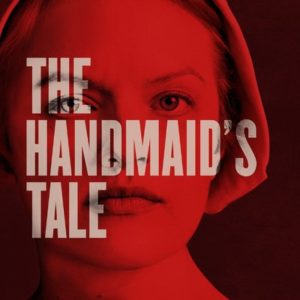 This post includes spoilers for “Gender Treachery” (Season 1, Episode 3) of The Handmaid’s Tale. The link on the left will have full summaries of all of the episodes. I will continue to mostly use this series to talk about my reaction to what has been happening to the characters, although I have summered some of the plot today. All of the links in this post may contain spoilers as well.
This post includes spoilers for “Gender Treachery” (Season 1, Episode 3) of The Handmaid’s Tale. The link on the left will have full summaries of all of the episodes. I will continue to mostly use this series to talk about my reaction to what has been happening to the characters, although I have summered some of the plot today. All of the links in this post may contain spoilers as well.
Offred’s main storyline this week revolved around whether or not she was pregnant. The Martha (cook) of her household was in charge of giving Offred her monthly supply of sanitary napkins, and when she didn’t ask for them at the usual time the entire household began to suspect that she might be pregnant.
Suddenly, Offred was being offered better quality food and having small whims obeyed. She was allowed to visit Ofwarren and the baby she had in the second episode, for example. Offred was even allowed to hold the baby, which isn’t something Handmaids are generally encouraged to do. It was surreal to see Serena Joy, the wife of the Commander, suddenly treating Offred with kindness and joy after spending the first two episodes bitterly resenting her presence in their home.
What made this part of the storyline even stranger was how quickly Serena Joy turned on Offred when Offred discovered that she wasn’t pregnant after all. I have had a handful of experiences in the past with people who assumed I was pregnant when I was not. It’s weird and inappropriate enough in our world when someone who isn’t your life partner or family doctor is that obsessed with what you will or won’t be doing with your reproductive organs. In Offred’s world, this sort of thing is downright dangerous due to how little power she has over what happens to her as long as Serena Joy doesn’t do anything that will damage her fertility. I can’t wait to see where this part of the storyline goes next. So far it is looking very promising, if also unbelievably creepy.
The most interesting part of this week’s episode by far, though, was what happened to Ofglen, the handmaid who was secretly part of the Resistance that Offred befriended in the first and second episode. At the end of episode two, Offred was shocked to meet a stranger at the end of her driveway for their daily walk to buy groceries. There was suddenly a new woman who was called Ofglen, and Offred had no idea what happened to the previous one she had been getting to know so well.
Offred was briefly tortured by Aunt Lydia and an Eye who were convinced she knew more about the old Ofglen’s criminal activities than she was letting on. As soon as they found out that Offred was presumed to be pregnant, though, the electric rod was put away and Offred was released.
I shudder to think what would have happened to her if this wasn’t the case. Handmaids are only valued for their reproductive abilities, as we’ve already been told and are also about to find out in even more excruciating detail.
So what happened to Ofglen, you’re probably wondering?
How was she caught? We’re not entirely sure yet. I am crossing my fingers that this will be mentioned in a later episode. We already know that Ofglen trusted Offred fairly quickly. Did she trust someone else too quickly as well, or was she caught another way? At this point, that is my best guess.
What was she charged with? She was charged with being a Gender Traitor. That is, the authorities somehow discovered that she was having a romantic and sexual relationship with the Martha who lived at her house. They were both taken into custody and disappeared permanently as far as the people who knew them are currently concerned.
What happened to them? Both characters were given a “trial” that consisted of nothing more than the authorities swearing on the Bible that what they claimed to have discovered was true. The “judge” for that case sentenced the Martha to death for her crime, and the punishment was carried out immediately after the trial ended. As an infertile woman, she was no longer of any use to The Republic of Gilead.
Ofglen’s fate was trickier. Even being a Gender Traitor doesn’t erase her value as one of the few fertile woman left in their society. The question is, how do you preserve that fertility while also preventing her from her acting on her forbidden sexual impulses in the future?
The final scene chilled me to my bones. The next time we saw Ofglen, she was waking up alone in a cold, white hospital room. I was relieved to see that she was still alive and still had use of her eyes, ears, and all four limbs.
As soon as she attempted to get out of bed, though, both she and the audience realized that something was terribly wrong. She could barely walk. Every single step was agonizing. I have three words for you: female genital mutilation. You see, you don’t need a clitoris to get pregnant.
There aren’t enough words in the English language to describe how horrified I am by this idea. What makes it even scarier is that there are millions of women around the world who have had this done to them. This is by no means something that was invented for the purposes of this storyline. It wasn’t part of the original story, but it makes perfect sense given all of the other awful things that happened to women in the book. I will be crossing my legs and wincing every time this is mentioned again in this series, but I do think it was a good addition to many other horrors of living in Gilead.
On a final note for today’s post, I’ve been thinking about the lowest possible age range I’d recommend this show to since I first started watching it. Based on the dark and disturbing things that have happened so far, I can’t currently recommend it to anyone under the age of 14. As important as its messages about feminism, fundamentalism, propaganda, and fascism are, this is not something that’s appropriate for younger audiences due to how violent it is.
Previous posts in this series:

 I don’t actually listen to music when I workout, so it’s odd to see how often strange songs get stuck in my head while I’m walking or lifting weights.
I don’t actually listen to music when I workout, so it’s odd to see how often strange songs get stuck in my head while I’m walking or lifting weights. Here is this week’s list of comic strips, essays, and other links from my favourite corners of the web.
Here is this week’s list of comic strips, essays, and other links from my favourite corners of the web. This post includes spoilers for “Offred” (Season 1, Episode 1) and “Birth Day” (Season 1, Episode 2 )of
This post includes spoilers for “Offred” (Season 1, Episode 1) and “Birth Day” (Season 1, Episode 2 )of  I have a confession to make: I haven’t meditated in weeks.
I have a confession to make: I haven’t meditated in weeks. Try, Try Again
Try, Try Again Here is this week’s list of essays and other links from my favourite corners of the web.
Here is this week’s list of essays and other links from my favourite corners of the web.
 Lately I’ve been participating in an online discussion about a famous series that started off beautifully and ended in a way that irritated many of its longterm fans.
Lately I’ve been participating in an online discussion about a famous series that started off beautifully and ended in a way that irritated many of its longterm fans. There are only two days left until The Handmaid’s Tale premiers on Hulu.
There are only two days left until The Handmaid’s Tale premiers on Hulu. Rituals Part 1
Rituals Part 1 Reason #1: I Already Know I’ll Like the Story.
Reason #1: I Already Know I’ll Like the Story.  Reason #3: I Know I’ll Find Something New in Them Every Time
Reason #3: I Know I’ll Find Something New in Them Every Time